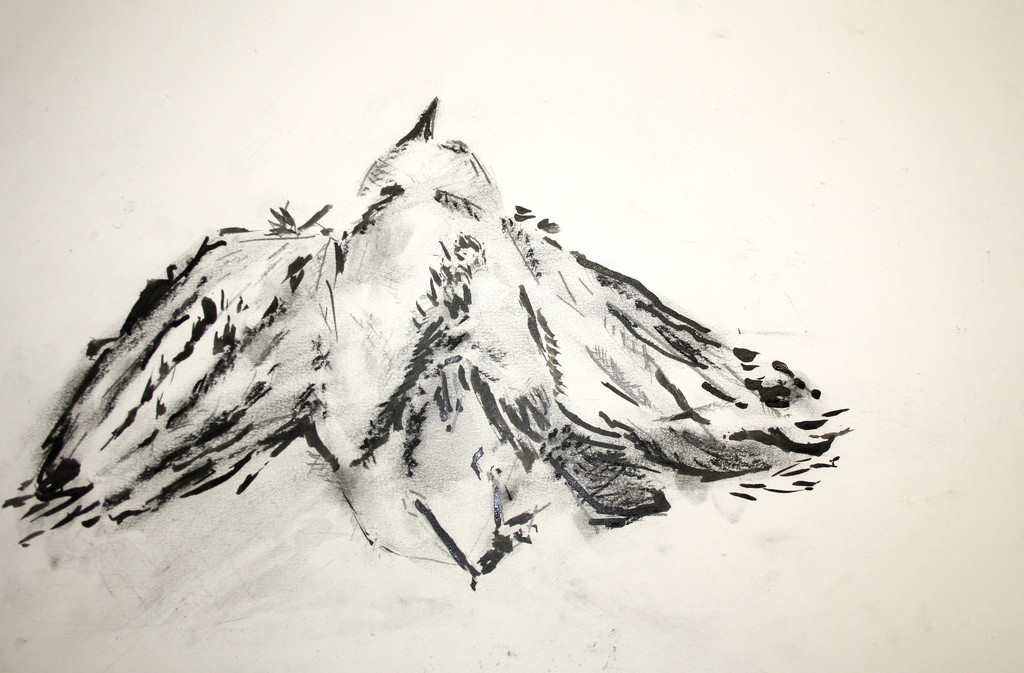Photo by Sophia.
I’ve been having an insightful shuffle through Mihaly Csikszentmihalyi’s book Creativity: The Work and Lives of 91 Eminent People. Mihaly is a seminal professor of Psychology and Management, and is the Founding Co-Director of the Quality of Life Research Center at Claremont. He writes:
“I have devoted 30 years of research to how creative people live and work, to make more understandable the mysterious process by which they come up with new ideas and new things. If I had to express in one word what makes their personalities different from others, it’s complexity. They show tendencies of thought and action that in most people are segregated. They contain contradictory extremes; instead of being an individual, each of them is a multitude.”
Nine out of the ten people in me strongly agree with that statement. As someone paid to be creative, I sometimes feel kaleidoscopic in my views or opinions, and that “multitude” of expressions sometimes confuses those around me. Why does that happen? My thoughts make cohesive sense to me, yet others sometimes feel that I am contradicting myself or switching positions. What is wrong with me?
Mihaly describes 9 contradictory traits that are frequently present in creative people:
01
Most creative people have a great deal of physical energy, but are often quiet and at rest. They can work long hours at great concentration.
02
Most creative people tend to be smart and naive at the same time. “It involves fluency, or the ability to generate a great quantity of ideas; flexibility, or the ability to switch from one perspective to another; and originality in picking unusual associations of ideas. These are the dimensions of thinking that most creativity tests measure, and that most creativity workshops try to enhance.”
03
Most creative people combine both playfulness and productivity, which can sometimes mean both responsibility and irresponsibility. “Despite the carefree air that many creative people affect, most of them work late into the night and persist when less driven individuals would not.” Usually this perseverance occurs at the expense of other responsibilities, or other people.
04
Most creative people alternate fluently between imagination and fantasy, and a rooted sense of reality. In both art and science, movement forward involves a leap of imagination, a leap into a world that is different from our present. Interestingly, this visionary imagination works in conjunction with a hyperawareness of reality. Attention to real details allows a creative person to imagine ways to improve them.
05
Most creative people tend to be both introverted and extroverted. Many people tend toward one extreme or the other, but highly creative people are a balance of both simultaneously.
06
Most creative people are genuinely humble and display a strong sense of pride at the same time.
07
Most creative people are both rebellious and conservative. “It is impossible to be creative without having first internalized an area of culture. So it’s difficult to see how a person can be creative without being both traditional and conservative and at the same time rebellious and iconoclastic.”
08
Most creative people are very passionate about their work, but remain extremely objective about it as well. They are able to admit when something they have made is not very good.
09
Most creative people’s openness and sensitivity exposes them to a large amount of suffering and pain, but joy and life in the midst of that suffering. “Perhaps the most important quality, the one that is most consistently present in all creative individuals, is the ability to enjoy the process of creation for its own sake. Without this trait, poets would give up striving for perfection and would write commercial jingles, economists would work for banks where they would earn at least twice as much as they do at universities, and physicists would stop doing basic research and join industrial laboratories where the conditions are better and the expectations more predictable.”
Sometimes what appears to be a contradiction on the surface is actually a harmony in disguise. My problem has been primarily one of communication. I am learning to let people know what I am thinking and why, and explaining myself in a way that helps them understand why I am discussing multiple perspectives instead of just cleanly stating my own. At first it might not make sense, but give me/us long enough, and it will.


Sums up my story. 🙂
There is no distinction between “creative people” and “others.” We are ALL creative people in our own ways, sometimes waiting to discover new avenues.
The smartest comment made about this article.
The interesting thing about the idea that all are creative, is that many people do not accept their own creativity. For some, it seems a dangerous thing. Accepting and acting on one’s creativity requires courage it seems and a willingness to question a status quo. If we are all creative, why do so many not act on it?
I think creation comes from the different ways in which people are motivated by their core values. I think for some people, this can be a fluid sense of establishment. For others, it can be guided by an absolute being. As you’ll notice if you read some of these comments, its the former group that seem to be taking to what this article has to say. The latter seems to pick at the sort of “horoscope-like” motivations of this article.
We are all creative, in the sense that we execute and execute events that both affect others, and bring corporal forms of some sort into the world. I think some people need to define themselves to a stricter subset of creation (in an art for arts sake sort of way), while others are content on being a part of a group and contributing without being recognized as a “creative”.
I don’t know what I’m really trying to say here, other than people, in general, are really complex, and this article is good because it helps some people realize their traits and appreciate belonging to this group. On the other hand, I think the article is bad because it causes a barrier to be drawn that really doesn’t exist.
Personally I feel there’s a massive distinction. While everyone may hold some form of creativity (unshared or acknowledged) there are those that fit the nine descriptives above, to a T. I know many people that consider themselves creative (it’s subjective), and many people that do not.
Reading the post was like reading symptoms of a disease I suspected I have. Diagnosis made.
This is my favorite masterpiece of yours. Keep it, live it. And, for God’s sake, and yours, enjoy it.
Even a Grandma can make a beautiful, and never before seen design, into a potholder. A handy and memorable thing to do with one’s time, when all else fails. I love the potholders I own, from old ladies I have known, and remember fondly. I have five. They are tucked away and not to be soiled, but rather, treasured by me.
Thank you – this hit the sweet spot
Mathew,
great post.
I love the idea of studying creative people to see how they work, and I’ve spent the last few years rubbing elbows with poets, novelists, painters and various other creative people.
However, having come from a math background, I feel that something is missing in the analysis. Without including non-creative people in some kind of qualitative research, something is bound to be missing from the analysis. After all, there may well be people who have all of these traits who aren’t particularly creative, but you aren’t looking at these people. By looking only at the creative people, you tend to have a very biased view. There was a WWII mathematician studying bombers who had returned from bombing runs. He recommended, against all instinct, to reinforce the areas where the plane hadn’t been hit. Similarly, any study of creative people should include non-creative people as well. Looking at non-creative people will give you insight not only into creative people, but into how to be more creative.
Also, like one of the other commenters, everyone who is agreeing wholeheartedly, is saying “Me! Me! I’m creative. You so get me.”, but it is somewhat horoscope-ish, covering almost everything, i.e. “creative people are usually X and not-X at the same time” – of course, no one is set in stone, and everyone can contain one of these opposites in at least one of the areas.
I’ve known many creative people who do NOT fit this blog’s description. I’ve also know many people who DO fit this description who are NOT creative. For those reasons, I read this article not as factual science but as sophomoric Self-Love.
Very interesting article, however aren’t those symptoms apply to most of the people? Conclusion? Every single person is an creative individual and the truth is that no one can understand the second individual truly because sometime we can’t even understand our self.
I read at least one comment (there may have been more) talking about the elephant in the room… Is there any humility to be found in those who claim creativity? Is it just me or do the majority of those commenting claim to be geniuses? Get a life, people.